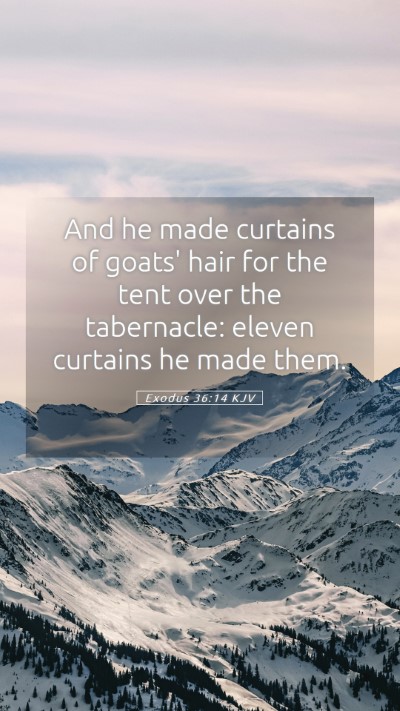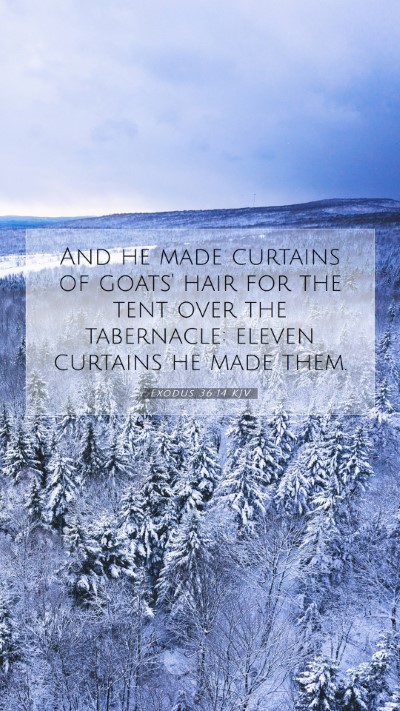Exodus 36:14 Commentary and Analysis
The verse Exodus 36:14 states:
“And he made curtains of goats' hair for the tent over the tabernacle: eleven curtains he made.”
Understanding Scripture: Exodus 36:14
This verse describes a specific element of the construction of the Tabernacle in the wilderness as commanded by God to Moses. It focuses on the curtains made from goats' hair, which were an integral part of the Tabernacle's structure.
Bible Verse Interpretations
- Matthew Henry's Commentary:
Henry explains that the curtains of goats’ hair signify the humble and ordinary nature of the dwelling place of God among His people. This choice of materials indicates that God's presence can dwell among them despite their humble circumstances.
- Albert Barnes' Commentary:
Barnes draws attention to the practical aspects of the curtains, noting their purpose in providing shelter and protection for the holy items within the Tabernacle. He emphasizes the careful craftsmanship involved in creating these curtains, symbolizing the care and reverence that should accompany the work of God.
- Adam Clarke's Commentary:
Clarke discusses the symbolism of goats' hair, often associated with sin offerings in the Old Testament. This may suggest an element of atonement and humility, reminding the Israelites of their need for God's grace and mercy.
Bible Study Insights
In studying this verse, we gain insights into:
- **The significance of materials used in the Tabernacle:** Each material had a specific meaning and representation.
- **The craftsmanship involved:** It reflects the dedication and reverence required when constructing a place for God’s presence.
- **The relationship between God and His people:** The use of common materials illustrates how God chose to dwell among His people in their everyday lives.
Scripture Analysis
Exodus 36:14 can be seen as part of a larger narrative regarding the Tabernacle's construction:
- God’s Instruction: The chapter shows Moses following God’s commands precisely, highlighting the importance of obedience in worship.
- Collective Effort: The context of the Tabernacle's construction involved contributions from the entire community, showcasing unity among the Israelites.
- Symbolic Representation: The various elements of the Tabernacle represent aspects of God’s nature and His relationship with humanity.
Historical Context of Bible Verses
The construction of the Tabernacle took place during the Israelites' exodus from Egypt, a time fraught with challenges and the need for divine guidance. This verse is set against a backdrop of God establishing a covenant with His people, emphasizing His desire to dwell among them.
Applying Bible Verses to Daily Life
Exodus 36:14 teaches us valuable lessons about:
- God's accessibility: God desires to dwell among His people, making His presence accessible in our daily lives.
- Value of humble beginnings: God uses ordinary materials and people to fulfill His plans.
- Importance of community: The construction of the Tabernacle involved the collective effort of the Israelites, highlighting the value of community engagement in God's work.
Meaning of Bible Verses
The phrase “curtains of goats’ hair” can symbolize:
- Protection and shelter: Just as the curtains protected the contents of the Tabernacle, God offers us protection in our lives.
- Humility: The humble materials used reflect the nature of Christ, who came in humility to serve and save.
- Separation from the world: The curtains create a boundary between the holy space of the Tabernacle and the outside world, symbolizing God's holiness.
Biblical Exegesis
A closer examination reveals that Exodus 36:14 fits into a broader pattern of God’s instructions regarding the Tabernacle and worship. Each component has a purpose and a meaning.
Cross References
- Exodus 26:7-13 - Details the curtains and coverings for the Tabernacle.
- 1 Timothy 6:8 - Recognizes the enduring value and significance of basic provisions.
- Leviticus 16:10 - Discusses the symbolism of goats in the context of atonement and sacrifice.


